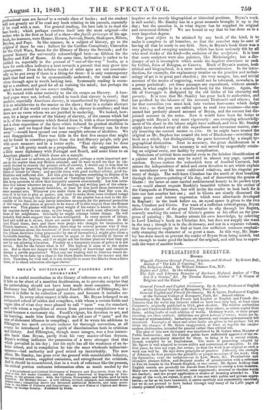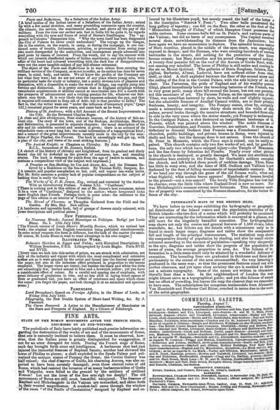PUBLICATIONS RECEIVED.
BOOKS.
Wayside Pictures through France, Belgium, and Holland. By Robert Bell, Author of 'The Life of Canning," &c. The Religious Ideas. By William Johnson Fox, M.P. Before and After. In two volumes. The Life and Literary Remains of Barbara Holland, Author of "This Son of a Genius," Bre. By Thomas Ramsay, Anther of "A Glance of Belgium and the Rhine."
General French and English Dictionary. By A. Spiers, Professor of English at the National College of Bonaparte, Paris, &c. General English and French Dictionary. By A. Spiers Professor of English at the National College of Bonaparte, Paris, &c. Second edition. [According to Mr. Spiers the French and English or English and French dic- tionaries that the world has hitherto relied on have been very bad, at least since Cotgrave's, originally published in 1611, grew obsolete. The whilom authorities Boyer and Chambaud did little more than copy from others, as others copied from them; adding faults at each addition of words. Ordinary words, or their proper meaning, are often omitted; definitions are given instead of terms; words are fa- bricated or mistranelated; barbarisms are biserted, and idioms systematically left unnoticed. Examples of these and other faults are given in the preface: but we think the charges of Mr. Spiers exaggerated, at least as regards the smaller modern dictionaries, intended for general rather than critical use. The plan of this new dictionary was sanctioned by M. Guizot when Minister of Public Instruction; and the French public have sufficiently approved of the vo- lume more particularly intended for them, to bring it to a second edition, though compiled by an Englishman. The mode of proceeding adopted by Mr. Spiers is well adapted to secure utility and correctness of execution. In the first place, he does not copy, but revise; so that the work is as original as such a work can well be. He lays down principles of practice. Following the example of Johnson, he first presents the primitive or proper meanings of the word ; then the figurative; next the technical—as in Law, Music, Soc. Peculiarities and idiomatic phrases follow' and frequent marks of pronunciation with a reference to French sounds in the French-English, or vice versa; Mr. Spier' holding that English sounds are generally too remote from French to convey a true measure. Many new words have been inserted, some suppressed ; unusual or obsolete words are marked ; and the proper application or shades of meaning attended to. The design of the work, we repeat, is good; it has met with public and private appro. bation ; so far as we have examined, it seems carefully and consistently executed; but we do not pretend to have looked through very many of its 1,300 pages of closely-printed triple columns.] Facts and Reflections. By a Subaltern of the Indian Army.' [A brief outline of the Indian career of a Subaltern of the Indian Army; mixed np with a few social sketches, and many grumbling comments upon the country, the climate, the service, the matrimonial market, and above all the pay of the military. From the time our author sets foot in India till he quits it, he regards everything with the eyes and frame of mind of Sterne's Smelfungus. The ap- proach to Calcutta" disappoints him. "Why the town itself has been designated the City of Palaces he never could understand." The voyage up the Ganges, life in the station on the march, in camp, or daring the campaign, is one con- tinued scene of station, listlessness, privation, or provocation from seeing your own merit disregarded by the authorities, and incompetent people advanced into good pests by means of interest. From the wrath, not to say the rancour with which our juvenile disaffected speaks of Indian matrimony, one might fancy some affair of the heart had coloured everything with the dark hue of disappointment, were not the more tangible subject of pay still oftener reiterated. • The object of the Facts and Reflections is to warn others from entering the military service of the Company, sons not to suffer, as its author has done for seven years, in mind, body, and estate. We all know the profits of the Company are not what they were ; but we are not aware of any place where young men, with no particular taste for study or industry, but a pretty obvious love of pleasure and dissipation, with a disposition to make the worst of things, can rapidly jump into fortune and distinction. It is pretty certain that in England striplings without remarkable acquirements or abilities cannot at once tumble into 201. a month with the prospects of advancement and a retiring pension for life, whatever our Sub- altern may think. It is very likely that the expenses exhaust the pay, and that it requires self-constraint to keep out of debt: but is that peculiar to India? The fact is, that the writer went out "under the influence of temporary pique," (page 132,) remained piqued for seven years, and came back as he went.] History of St. Andrews; with a full Account of the Recent Improvements in the City. By the Reverend Charles Roger.
[A close and able abridgment, from elaborate sources, of the history of this an- cient city. The story of the town, and of the Bishops, Archbishops, Martyrs, and Reformation, is presented in separate chapters; the usual description of the -city and its celebrities ancient and modern is given; there is an account of its remarkable men—a very long list; the usual information of a topographical kind ; and a resume of the great improvements recently made in the city by the exer- tions of Major Playfair, the Provost. The book is exceedingly well got up, with a plan of the city, andviews of its most striking features.]
The Ancunt Knight; or Chapters on Chivalry. By John Fuller Russell, B.C.L., Incumbent of St. James's, Enfield.
[A sketch of the history of chivalry and knighthood, from its gradual and dimly traced rise till its downfall on the growth of commerce, law, and standing armies. The book is designed for youth from the age of twelve to sixteen, and Contains a compendious view of the subject well expressed.]
A Treatise on Sea-Bathing, its Use and Abuse, &c., and the Diseases Re- lieved by a Residence on the Sea-shore. By Thomas Kelly, Surgeon, &c. [A sensible and popular compilation on hot, cold, and vapour sea-water baths. But Mr. Kelly assumes a greater lack of popular compendiums on the subject of bathing than is really the case.] The Works of G. P. R. James, Esq., revised and corrected by the Author. With an Introductory Preface. Volume X_XI. " Caatlenau."
[There is nothing new in this edition of one of Mr. James's best romances, unless it be a view of " Castienan," designed by the author; whose foreground looks more English than French. Perhaps there is some error: the reference to the 'page of this edition is an interior of Versailles.]
The Moral of Flowers; or Thoughts Gathered from the Field and the Garden. By Mrs. Hey. New edition.
[A handsome and agreeable book, full of groups of flowers nicely coloured, with prose descriptions and poetical pieces.] NEW PER/ODICA_L.
Le Nouveau Monde; Journal Historique et Politiqne. Redige par Louis Blanc. No. I. 15th July 1849. [The French version of Louis Blanc's Monthly Review, which we noticed last week; the original and the English translation being published simultaneously. In some minor respects the form is different, but the bulk of the matter the same. Of course, M. Louis Blanc is read to most advantage in his own tongue.]
• ILLUSTRATED WORK.
Roberts's Sketches in Egypt and Nubia; with Historical Descriptions by William Brockedon, F.R.S. Lithographed by Louis Haghe. Parts XVII. and XVIIL [Every time we look into this series of prints, wears struck with admiration, not only at the industry and vigour with which the most complicated and extensive aces are as it were grasped by the artist and forced into the limited compass of the paper, but also at the immense effect produced in proportion to the means employed. The larger views are tinted; but besides the black and white the tints are exceedingly few, limited almost to blue and a brownish yellow; yet you have a considerable effect of colour. By a careful and sparing use of emphasis, with great delicacy of gradations in tone, and no less skill in laying broad spaces of even or graduated tint, you have an effect of substance and space which cheat the sense: you forget the paper, and look through it at an animated and spacious scene.]
PAMPHLETS.
Lord Brougham's Speech on Foreign Affairs, in the House of Lords, on Friday 20th July 1849.
Idiography, the New Double System of Short-hand Writing, &c. By J. Fancourt.
The Curse Rem.oved. A Letter to the Manufacturers of Manchester on the State and Prospects of England. By a Citizen of Edinburgh.



























 Previous page
Previous page